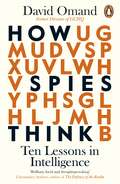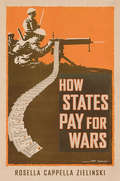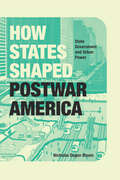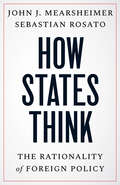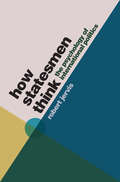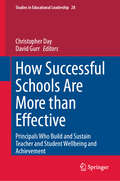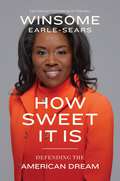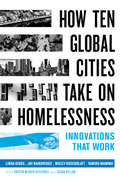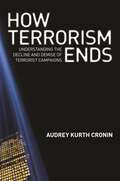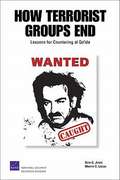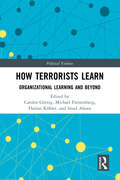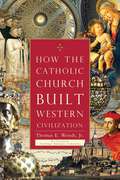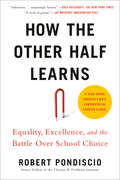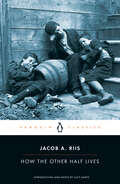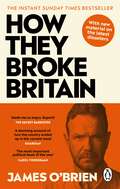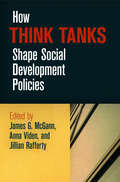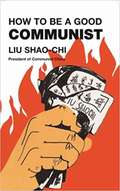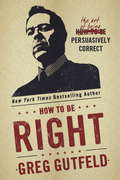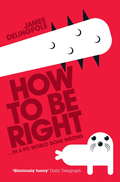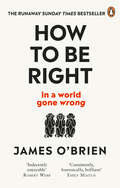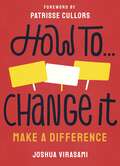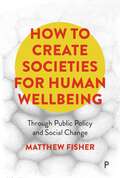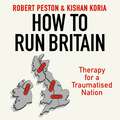- Table View
- List View
How Spies Think: Ten Lessons in Intelligence
by David OmandFrom the former director of GCHQ, learn the methodology used by British intelligence agencies to reach judgements, establish the right level of confidence and act decisively.Full of revealing examples from a storied career, including key briefings with Prime Ministers and strategies used in conflicts from the Cold War to the present, in How Spies Think Professor Sir David Omand arms us with the tools to sort fact from fiction.And shows us how to use real intelligence every day.*****'One of the best books ever written about intelligence analysis and its long-term lessons' Christopher Andrew, The Defence of the Realm: The Authorized History of MI5'An invaluable guide to avoiding self-deception and fake news' Melanie Phillips, The TimesWINNER OF THE NEAVE BOOK PRIZE 2022LONGLISTED FOR THE ORWELL PRIZE FOR POLITICAL WRITING 2021
How States Pay for Wars
by Rosella Capella ZielinskiArmies fight battles, states fight wars. To focus solely on armies is to neglect the broader story of victory and defeat. Military power stems from an economic base, and without wealth, soldiers cannot be paid, weapons cannot be procured, and food cannot be bought. War finance is among the most consequential decisions any state makes: how a state finances a war affects not only its success on the battlefield but also its economic stability and its leadership tenure. In How States Pay for Wars, Rosella Cappella Zielinski clarifies several critical dynamics lying at the nexus of financial and military policy.Cappella Zielinski has built a custom database on war funding over the past two centuries, and she combines those data with qualitative analyses of Truman's financing of the Korean War, Johnson’s financing of the Vietnam War, British financing of World War II and the Crimean War, and Russian and Japanese financing of the Russo-Japanese War. She argues that leaders who attempt to maximize their power at home, and state power abroad, are in a constant balancing act as they try to win wars while remaining in office. As a result of political risks, they prefer war finance policies that meet the needs of the war effort within the constraints of the capacity of the state.
How States Shaped Postwar America: State Government and Urban Power
by Nicholas Dagen BloomThe history of public policy in postwar America tends to fixate on developments at the national level, overlooking the crucial work done by individual states in the 1960s and ’70s. In this book, Nicholas Dagen Bloom demonstrates the significant and enduring impact of activist states in five areas: urban planning and redevelopment, mass transit and highways, higher education, subsidized housing, and the environment. Bloom centers his story on the example set by New York governor Nelson Rockefeller, whose aggressive initiatives on the pressing issues in that period inspired others and led to the establishment of long-lived state polices in an age of decreasing federal power. Metropolitan areas, for both better and worse, changed and operated differently because of sustained state action—How States Shaped Postwar America uncovers the scope of this largely untold story.
How States Think: The Rationality of Foreign Policy
by John J. Mearsheimer Sebastian RosatoA groundbreaking examination of a central question in international relations: Do states act rationally? To understand world politics, you need to understand how states think. Are states rational? Much of international relations theory assumes that they are. But many scholars believe that political leaders rarely act rationally. The issue is crucial for both the study and practice of international politics, for only if states are rational can scholars and policymakers understand and predict their behavior. John J. Mearsheimer and Sebastian Rosato argue that rational decisions in international politics rest on credible theories about how the world works and emerge from deliberative decision‑making processes. Using these criteria, they conclude that most states are rational most of the time, even if they are not always successful. Mearsheimer and Rosato make the case for their position, examining whether past and present world leaders, including George W. Bush and Vladimir Putin, have acted rationally in the context of momentous historical events, including both world wars, the Cold War, and the post–Cold War era. By examining this fundamental concept in a novel and comprehensive manner, Mearsheimer and Rosato show how leaders think, and how to make policy for dealing with other states.
How Statesmen Think: The Psychology of International Politics
by Robert JervisRobert Jervis has been a pioneering leader in the study of the psychology of international politics for more than four decades. How Statesmen Think presents his most important ideas on the subject from across his career. This collection of revised and updated essays applies, elaborates, and modifies his pathbreaking work. The result is an indispensable book for students and scholars of international relations.How Statesmen Think demonstrates that expectations and political and psychological needs are the major drivers of perceptions in international politics, as well as in other arenas. Drawing on the increasing attention psychology is paying to emotions, the book discusses how emotional needs help structure beliefs. It also shows how decision-makers use multiple shortcuts to seek and process information when making foreign policy and national security judgments. For example, the desire to conserve cognitive resources can cause decision-makers to look at misleading indicators of military strength, and psychological pressures can lead them to run particularly high risks. The book also looks at how deterrent threats and counterpart promises often fail because they are misperceived.How Statesmen Think examines how these processes play out in many situations that arise in foreign and security policy, including the threat of inadvertent war, the development of domino beliefs, the formation and role of national identities, and conflicts between intelligence organizations and policymakers.
How Successful Schools Are More than Effective: Principals Who Build and Sustain Teacher and Student Wellbeing and Achievement (Studies in Educational Leadership #28)
by Christopher Day David GurrArising from new research of members of the International Successful School Principalship Project, this book presents cases of school and leadership success from across 12 countries. It provides critically informed writing, informed by ecological systems theory, which questions the uncritical application of single lens, adjectival leadership models, challenges critical theorists’ views of teachers’ and leaders’ as necessarily compliant with so-called neoliberal policy agendas. In their place, the chapters provide compelling evidence not only of who successful leaders are and what they do, but how they do it as they meet and manage the challenges of building and sustaining success in uncertain times in a range of cultures and social contexts. In these schools, principals assert their broad educational values, professional identities, agency and resilience, drawing upon a range of strategies, technical and human relating qualities and skills in building and sustaining success for all. Whilst they acknowledge the influence of cultural, policy, and community contexts, they are not oppressed by these. The chapters provide a brief description of country and school contexts, the life and work of the principal, their leadership strategies and how they contribute to teacher wellbeing and teaching quality, leadership development in others, pedagogical leadership, cultures of trust, and community engagement. There is also consideration of how school leaders manage tensions and dilemmas, how success differs from effectiveness, and the characteristics and qualities of leaders that lead to success. It is a book which will stimulate school leaders and aspiring school leaders to consider more deeply their own work and its directions. For researchers and system leaders, it provides multi-level, multiple perspective case studies as part of the largest international educational leadership project ever undertaken. It is a ‘must read’, rich, timely professionally connected book.
How Sweet It Is: Defending the American Dream
by Winsome Earle-SearsThe first Black woman elected to statewide office in Virginia reveals in her memoir how her Christian faith, unwavering patriotism, and fervent commitment to conservative principles propelled her to serve and sacrifice for her country and a better future. Winsome Earle-Sears sent shock waves across Virginia and the country at large when she pulled off her stunning upset victory in November 2021 and became the first woman lieutenant governor of Virginia and the first Black woman, the first naturalized female citizen, and first female veteran elected to statewide office. She earned intense national coverage because of her unwavering support for Second Amendment rights and her strong commitment to education opportunity for all students. Now in her memoir, How Sweet It Is, Winsome will tell her story and explain how she arrived at that historic moment in time. A devout Christian, Winsome is also a true believer in the promise of the American Dream. Her father was approved to immigrate to the U.S.A. and left Jamaica, arriving in America on August 11, 1963, with only $1.75 in his pocket. Winsome joined him when she was just six years old, and ever since she has never ceased enthusiastically bucking conventions, defying expectations, and charging straight toward challenges. Winsome&’s remarkable story is one of faith and family, personal loss and perseverance, philanthropy and patriotism, service and sacrifice. But through it all, her Christian faith sustained her, drove her, and compelled her to give back to her community and her country. Her unyielding belief in the fundamental righteousness of America stands in stark opposition to the increasingly pervasive ideologies that are dividing the country. In How Sweet It Is, Winsome encourages Americans to never stop fighting for their country and shows them how to chart a new path forward.
How Ten Global Cities Take On Homelessness: Innovations That Work
by Linda GibbsCreative solutions for global cities addressing their urgent homeless crises. This book takes on perhaps the most formidable issue facing metropolitan areas today: the large numbers of people experiencing homelessnes within cities. Four dedicated experts with first-hand experience profile ten cities—Bogota, Mexico City, Los Angeles, Houston, Nashville, New York City, Baltimore, Edmonton, Paris, and Athens—to explore ideas, strategies, successes, and failures. Together they bring an array of government, nonprofit, and academic perspectives to offer a truly global perspective. The authors answer essential questions about the nature and causes of homelessness and analyze how cities have used innovation and local political coordination to address this pervasive problem. Ten Global Cities will be an invaluable resource not only for students of policy and social work but for municipal, regional, and national policymakers; nonprofit service providers; community advocates and activists; and all citizens who want to collaborate for real change. These authors argue that homelessness is not an insurmountable social condition, and their examples show that cities and individuals working in coordination can lead the charge for better outcomes.
How Terrorism Ends: Understanding the Decline and Demise of Terrorist Campaigns
by Audrey Kurth Cronin&“A landmark study."—Robin Wright, The New YorkerWhy every terrorist movement comes to an end—and how this history can help us combat today's terrorist threatsAmid the fear following 9/11 and more recent terror attacks, it is easy to forget the most important fact about terrorist campaigns: they always come to an end—and often far more quickly than expected. Contrary to what many assume, when it comes to dealing with terrorism it may be more important to understand how it ends than how it begins. Only by understanding the common ways in which terrorist movements have died out or been eradicated in the past can we hope to figure out how to speed the decline of today's terrorist groups, while avoiding unnecessary fears and costly overreactions. In How Terrorism Ends, Audrey Kurth Cronin examines how terrorist campaigns have met their demise over the past two centuries, and applies these enduring lessons to outline a new strategy against al-Qaeda.This book answers questions such as: How long do terrorist campaigns last? When does targeting the leadership finish a group? When do negotiations lead to the end? Under what conditions do groups transition to other forms of violence, such as insurgency or civil war? How and when do they succeed or fail, and then disappear? Examining a wide range of historical examples—including the anti-tsarist Narodnaya Volya, the Provisional IRA, Peru's Shining Path, Japan's Aum Shinrikyo, and various Palestinian groups—Cronin identifies the ways in which almost all terrorist groups die out, including decapitation (catching or killing the leader), negotiation, repression, and implosion.How Terrorism Ends is the only comprehensive book on its subject and a rarity among all the books on terrorism—at once practical, optimistic, rigorous, and historical.
How Terrorist Groups End: Lessons for Countering Al Qa'ida
by Seth G. Jones Martin C. LibickiAll terrorist groups eventually end. But how do they end? The evidence since 1968 indicates that most groups have ended because (1) they joined the political process (43 percent) or (2) local police and intelligence agencies arrested or killed key members (40 percent). Military force has rarely been the primary reason for the end of terrorist groups, and few groups within this time frame have achieved victory. This has significant implications for dealing with al Qa'ida and suggests fundamentally rethinking post-9/11 U.S. counterterrorism strategy: Policymakers need to understand where to prioritize their efforts with limited resources and attention. The authors report that religious terrorist groups take longer to eliminate than other groups and rarely achieve their objectives. The largest groups achieve their goals more often and last longer than the smallest ones do. Finally, groups from upper-income countries are more likely to be left-wing or nationalist and less likely to have religion as their motivation. The authors conclude that policing and intelligence, rather than military force, should form the backbone of U.S. efforts against al Qa'ida. And U.S. policymakers should end the use of the phrase 'war on terrorism' since there is no battlefield solution to defeating al Qa'ida.
How Terrorists Learn: Organizational Learning and Beyond (Political Violence)
by Carolin Görzig Michael Fürstenberg Florian Köhler Imad AlsoosThis volume helps us understand the transformations of terrorist organisations, and the conflicts they are involved in, by broadening the perspective on what is considered terrorist learning. Using a variety of methodological approaches and empirical data, the volume offers a look at the clandestine inner lives of groups from different continents and ideological backgrounds in order to explore from whom they learn and how, and what the outcomes are. Their internal and external interactions are examined within their socio-political contexts to illuminate how they adapt to challenges or fail to do so. Unpacking the question of ‘how do terrorists learn’ helps us to grasp not only changes of violent means of action but also of operational and strategic approaches and, ultimately, even transformations of the ends pursued. The chapters demonstrate that terrorist learning is not principally different from that of other human organisations. The contributors draw on conceptual frameworks of organizational learning, but also broaden the scope beyond the organizational framework to acknowledge the variety of forms of informal and decentralized learning characteristic of much contemporary terrorism. This book will be of much interest to students of terrorism studies, violent extremism, organisational studies and International Relations.
How The Catholic Church Built Western Civilization
by Thomas E. Woods Jr.Ask a college student today what he knows about the Catholic Church and his answer might come down to one word: "corruption." But that one word should be "civilization." Western civilization has given us the miracles of modern science, the wealth of free-market economics, the security of the rule of law, a unique sense of human rights and freedom, charity as a virtue, splendid art and music, a philosophy grounded in reason, and innumerable other gifts that we take for granted as the wealthiest and most powerful civilization in history. But what is the ultimate source of these gifts? Bestselling author and professor Thomas E. Woods, Jr. provides the long neglected answer: the Catholic Church. Woods's story goes far beyond the familiar tale of monks copying manuscripts and preserving the wisdom of classical antiquity. In How the Catholic Church Built Western Civilization, you'll learn: · Why modern science was born in the Catholic Church · How Catholic priests developed the idea of free-market economics five hundred years before Adam Smith · How the Catholic Church invented the university · Why what you know about the Galileo affair is wrong · How Western law grew out of Church canon law · How the Church humanized the West by insisting on the sacredness of all human life No institution has done more to shape Western civilization than the two-thousand-year-old Catholic Church-and in ways that many of us have forgotten or never known. How the Catholic Church Built Western Civilization is essential reading for recovering this lost truth.
How The Obama Administration Threatens Our National Security
by Victor Davis HansonIn this revealing broadside, Victor Davis Hanson explains how President Obama has imprinted his domestic ideology of victimhood onto a therapeutic, Carter-inspired foreign policy. In Obama's vision, the United State renounces its role as a defender of the postwar order and instead becomes an agent of global change - one that questions our existing system of defense, values, alliances, interests, and commerce.In tactical terms, Obama believes that his 'hope-and-change' rhetoric and non-traditional background give him a moral authority abroad that will trump any inconsistency in U.S. foreign policy. But, as Hanson explains, at some future date, regional hegemons like Iran, Russia and China will demand even more acquiescence on the theory that the present government of the United States either will not object, or will do nothing concrete to stop them.
How The Other Half Learns: Equality, Excellence, and the Battle Over School Choice
by Robert PondiscioAn inside look at America's most controversial charter schools, and the moral and political questions around public education and school choice.The promise of public education is excellence for all. But that promise has seldom been kept for low-income children of color in America. In How the Other Half Learns, teacher and education journalist Robert Pondiscio focuses on Success Academy, the network of controversial charter schools in New York City founded by Eva Moskowitz, who has created something unprecedented in American education: a way for large numbers of engaged and ambitious low-income families of color to get an education for their children that equals and even exceeds what wealthy families take for granted. Her results are astonishing, her methods unorthodox.Decades of well-intended efforts to improve our schools and close the "achievement gap" have set equity and excellence at war with each other: If you are wealthy, with the means to pay private school tuition or move to an affluent community, you can get your child into an excellent school. But if you are poor and black or brown, you have to settle for "equity" and a lecture--about fairness. About the need to be patient. And about how school choice for you only damages public schools for everyone else. Thousands of parents have chosen Success Academy, and thousands more sit on waiting lists to get in. But Moskowitz herself admits Success Academy "is not for everyone," and this raises uncomfortable questions we'd rather not ask, let alone answer: What if the price of giving a first-rate education to children least likely to receive it means acknowledging that you can't do it for everyone? What if some problems are just too hard for schools alone to solve?
How The Other Half Lives
by Jacob RiisBehind nearly every adult who is accused of a crime, becomes addicted to drugs or alcohol, or who is severely mentally ill and acting out in public, there is usually at least one extremely stressed-out parent. This parent may initially react with the bad news of their adult child behaving badly with, "Oh no!" followed by, "How can I help to fix this?" A very common third reaction is the thought, "Where did I go wrong--was it something I said or did, or that I failed to do when my child was growing up that caused these issues? Is this really somehow all my fault?" These parents then open their homes, their pocketbooks, their hearts, and their futures to "saving" their adult child--who may go on to leave them financially and emotionally broken. Sometimes these families also raise the children their adult children leave behind: 1. 6 million grandparents in the U. S. are in this situation. This helpful book presents families with quotations and scenarios from real suffering parents (who are not identified), practical advice, and tested strategies for coping. It also discusses the fact that parents of adult children may themselves need therapy and medications, especially antidepressants. The book is written in a clear, reassuring manner by Dr. Joel L. Young, medical director of the Rochester Center for Behavioral Medicine in Rochester Hills, Michigan; with noted medical writer Christine Adamec, author of many books in the field. In the wake of the Newtown shooting and the viral popularity of the post "I Am Adam Lanza's Mother," America is now taking a fresh look, not only at gun control, but also on how we treat mental illness. Another major issue is our support or stigmatization of those with adult children who are a major risk to their families as well to society itself. This book is part of that conversation.
How They Broke Britain: The Instant Sunday Times Bestseller
by James O'Brien***THE RUNAWAY BESTSELLER, WITH NEW MATERIAL FOR THE PAPERBACK***THE REVEALING, DEFINING ACCOUNT OF THE DARK NETWORK THAT BROKE OUR COUNTRY.Something has gone really wrong in Britain.Our economy has tanked, our freedoms are shrinking, and social divisions are growing. Our politicians seem most interested in their own careers, and much of the media only make things worse. We are living in a country almost unrecognisable from the one that existed a decade ago. But whose fault is it really? Who broke Britain and how did they do it?Bold and incisive as ever, James O'Brien reveals the shady network of influence that has created a broken Britain of strikes, shortages and scandals. He maps the web connecting dark think tanks to Downing Street, the journalists involved in selling it to the public and the media bosses pushing their own agendas. Over ten chapters, each focusing on a particular person complicit in the downfall, James O'Brien reveals how a select few have conspired - sometimes by incompetence, sometimes by design - to bring Britain to its knees.
How Think Tanks Shape Social Development Policies
by James G. McGann Anna Viden Jillian RaffertyAcross the globe, there are more than four thousand policy institutes, or think tanks, that research or advocate for economic and social development. Yet the relationship between these organizations and the policies they influence is not well understood. How Think Tanks Shape Social Development Policies examines case studies drawn from a range of political and economic systems worldwide to provide a detailed understanding of how think tanks can have an impact on issues such as education policy, infrastructure, environment and sustainable development, economic reform, poverty alleviation, agricultural and land development, and social policy.Each chapter provides an overview of the approaches and organizational structures of specific think tanks, as well as the political, economic, and social opportunities and the challenges of the environments in which they operate. The contributors study the stages of innovative think-tank-aided strategies implemented in highly industrialized world powers like the United States and Russia, emerging countries such as China, India, Brazil, and South Korea, and developing nations that include Ethiopia, Kenya, and Tanzania. Accompanied by an extensive introduction to contextualize the history and theory of policy institutes, this comprehensive comparison of policy success stories will be instructive and transferable to other think tanks around the globe.Contributors: Assefa Admassie, Celso Castro, Kristina Costa, Francisco Cravioto, Marek Dabrowski, Matt Dann, He Fan, Rajeev Gowda, Oh-Seok Hyun, Christian Koch, Jitinder Kohli, R. Andreas Kraemer, Elena Lazarou, William Lyakurwa, Ashwin Mahesh, Florencia Mezzadra, Partha Mukhopadhyay, Mcebisi Ndletyana, Sridhar Pabbisetty, Miguel Pulido, Marco Aurelio Ruediger, María Belén Sánchez, Dmitri Trenin, Samuel Wangwe, Vanesa Weyrauch, Maria Monica Wihardja, Rebecca Winthrop, Wang Xiaoyi.
How To Be A Good Communist
by Liu Shao-ChiA compilation of a series of lectures by Liu Shao-Chi (Mao Tse-Tung's number-two man and the President of Communist China) at the Yunan Institute of Marxism-Leninism in 1939, this book was more popular in Communist China than the works of Chairman Mao! For decades it was required reading for all party cadre on discipline and individual self-cultivation. More than 20 million copies have been printed and distributed in 80 countries. Paladin is proud to bring back the first U.S. edition of this work, originally published in this country in 1967, so that Americans can understand the historical and intellectual context of communism in China. This is especially important now that China has become a world power with which Western nations must increasingly contend
How To Be Right
by Greg GutfeldIt's not enough to be right, these days--especially when you're not left. To survive, the right must learn how to express nonliberal principles as effectively as possible, and persuade others of their point of view. It is an art that demands patience, research, humor, understanding, creative thinking, learning from your opponent and even mimicking their tactics. In How to Be Right: the Art of Being Persuasively Correct, Gutfeld reveals the strategies that have helped him keep a steady job for almost three decades. From "Discard Your Outrage" and "Outcompassion Them" To "Find the Right's Obama" and "Use your Mom," Gutfeld gives readers the tools they'll need to argue, influence, and convince their friends, family and foes throughout the 2016 election cycle.From the Hardcover edition.
How To Be Right
by James DelingpoleAs a journalist for the Sunday Telegraph and The Spectator, James Delingpole has expressed his thoughts - articulately and amusingly - on everything from politics to popular music, from school sports days to spliffs. In this A-Z of brief essays he turns his lively mind to modern society gone mad. Can't understand what's wrong with much-loved feet and inches? Don't believe the global-warming hype? Wondering whatever happened to good, old-fashioned universities? Pouring scorn on the state of Britain after ten years under Brown and Blair, HOW TO BE RIGHT couldn't have come along at a more appropriate time. Prepare to foam and splutter, and to be seriously entertained.
How To Be Right
by James DelingpoleAs a journalist for the Sunday Telegraph and The Spectator, James Delingpole has expressed his thoughts - articulately and amusingly - on everything from politics to popular music, from school sports days to spliffs. In this A-Z of brief essays he turns his lively mind to modern society gone mad. Can't understand what's wrong with much-loved feet and inches? Don't believe the global-warming hype? Wondering whatever happened to good, old-fashioned universities? Pouring scorn on the state of Britain after ten years under Brown and Blair, HOW TO BE RIGHT couldn't have come along at a more appropriate time. Prepare to foam and splutter, and to be seriously entertained.
How To Be Right: … in a world gone wrong
by James O'BrienThe voice of reason in a world that won’t shut up.The Sunday Times BestsellerWinner of the Parliamentary Book AwardsEvery day, James O’Brien listens to people blaming hard-working immigrants for stealing their jobs while scrounging benefits, and pointing their fingers at the EU and feminists for destroying Britain. But what makes James’s daily LBC show such essential listening – and has made James a standout social media star – is the incisive way he punctures their assumptions and dismantles their arguments live on air, every single morning.In the bestselling How To Be Right, James provides a hilarious and invigorating guide to talking to people with unchallenged opinions. With chapters on every lightning-rod issue, James shows how people have been fooled into thinking the way they do, and in each case outlines the key questions to ask to reveal fallacies, inconsistencies and double standards.If you ever get cornered by ardent Brexiteers, Daily Mail disciples or corporate cronies, this book is your conversation survival guide.
How To Change It: Make a Difference (Merky How To #2)
by Joshua VirasamiIntroducing the new ‘How To…’ series from #Merky Books: unlock your potential with our short, practical pocket-sized guides._______________________________________________________How to Change It: your indispensable guide to activismIs it possible to create real change? How can we as individuals help to solve some of the biggest issues of today? How can we overcome injustice and inequality wherever we are? Where does power sit, and how can we get it?How to Change It provides the answers to these questions, and many more. In three simple steps - educate, organise and agitate - artist and organiser Joshua Virasami sets out several lessons for successful campaigning, drawing on the experience and actions of a number of activist and political movements, including Extinction Rebellion, Occupy and Black Lives Matter.Written by Joshua VirasamiIntroduced by Patrisse Cullors: artist, organiser and freedom fighter from Los Angeles and co-founder of Black Lives Matter. She is the author of critically acclaimed When They Call You a Terrorist: A Black Lives Matter Memoir._______________________________________________________Designed to inspire and encourage readers to unlock their potential and provoke change, the How To series offers a new model in publishing, helping to break down knowledge barriers and uplift the next generation.Creatively presented and packed with clear, step-by-step, practical advice, this series is essential reading for anyone seeking guidance to thrive in the modern world. Curate your bookshelf with these collectible titles.
How To Create Societies for Human Wellbeing: Through Public Policy and Social Change
by Matthew FisherWellbeing is a hot topic: governments, psychologists and a thousand self-appointed ‘experts’ all claim to promote it and yet our societies are experiencing record levels of mental distress and ill-health. Why? Matthew Fisher presents a compelling new perspective on psychological wellbeing informed by evidence on human stress responses. He shows how our mental health is shaped by the social and cultural conditions in which we all live. Developing arguments and strategies for a society truly committed to wellbeing, this book offers new ways to understand the problems facing modern societies and ways to respond through political and social change.
How To Run Britain: Therapy For A Traumatised Nation
by Robert PestonTHE MUST-READ BOOK FROM ITV'S ROBERT PESTON AND KISHAN KORIA, REVISED AND UPDATED FOLLOWING THE GENERAL ELECTION *Previously published as Bust?*---------Britain is facing uncertainty, threats and risk: new Prime Minister, new government, new political landscape, at home and abroad. But how much should change? And how much will change?How To Run Britain is a plea from Robert Peston and Kishan Koria to own what's gone wrong and make courageous reforms to everything, from the way we manage the economy to how we vote. We all know that, over the past fifteen years, British living standards have stagnated, inequality between - and within - communities has grown rampant, politicians have lost credibility and the trust of the nation. Millions say they are unheard and disenfranchised, victimised even. A far-right racist minority feels entitled to riot. But what do those problems really mean - and how do we fix them? How can politicians win the trust back from voters, from teachers, doctors, students, pensioners - all those who feel left behind by those who purport to act in their best interest?Peston and Koria's argument is simple: first, we must interrogate everything that has gone wrong, and build solutions from there. This is not the time to shy away from the recent past, nor should we indulge in it. Instead, we should take the lessons learned over the past fifteen years and build a future-focused, strategic plan for restoring economic, political and social security to the country we know and love.How To Run Britain is a manifesto for change in its simplest, clearest form, from the minds of two people who have seen it all.This is an updated, retitled edition of Bust? by Robert Peston and Kishan Koria, published in 2023.
